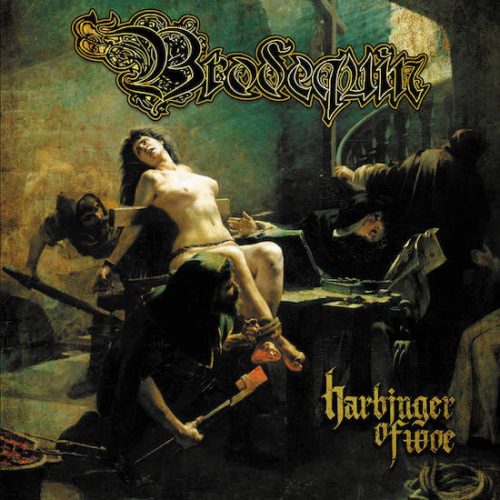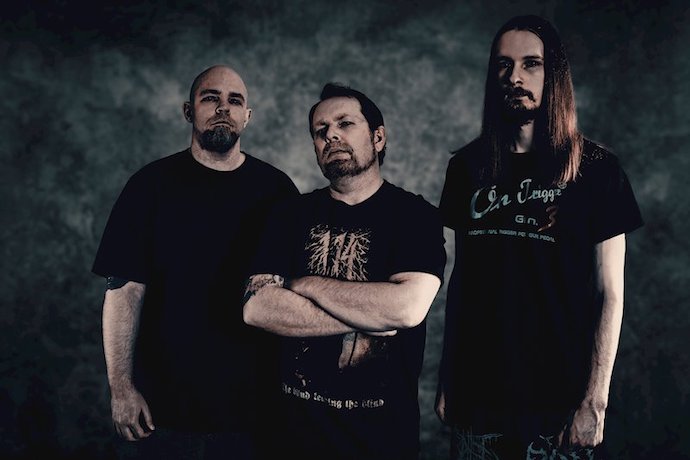
(Andy Synn embraces his inner masochist with the torturous new album from Brodequin)
Let’s be clear about something… if they hadn’t disappeared for almost twenty years it’s highly likely that the name Brodequin would be talked about just as often, and held in as just as high regard, as the “Big Ds” (Dying Fetus, Deeds of Flesh, Defeated Sanity, Disgorge… the list goes on) of Brutal Death Metal.
Hell, some people already put them up on that same level, and with damn good reason, especially since their third (and, for a while at least, final) album, Methods of Execution, was one of the most definitively brutal, and brutally definitive, statements of the early 2000s.
But now they’re back, and the big question on everyone‘s lips is – has time dulled their blades, or are the terrible trio still just as sharp, and as sick, as ever?

Well, it doesn’t take long for you to get your answer, let me tell you, as the opening combo of “Diabolical Edict” and “Fall of the Leaf” immediately subject you to the sort of barbaric sonic beating – all delivered at an almost unrelentingly breakneck pace that rarely lets up (and, when it does, it’s usually just to grind your bones to dust with a humongous groove or smash you in the face with a suitably sickening slam part) – that strips away, violently, the last twenty-ish years and makes them seem like they never even happened.
That’s not to say, however, that Brodequin have simply been frozen in time since the early 00s, as there’s ample evidence that the band (original members Mike and Jamie Bailey now joined by new drummer Brennan Shackelford) have learned a few new tricks – or, at least, further refined some old ones – along the way too, especially when it comes to the use of subtle atmospheric embellishments during tracks like “Theresiana” or the surprisingly (I might even say shockingly) moody “Of Pillars and Trees”.
Perhaps most impressive of all, however, is that Brodequin manage to pack all of this – all the serrated, finger-shredding riffs, frantic, yet lethally-focussed drums, and gurgling, gutter-trash gutturals, plus a plethora of hateful hooks, a handful of perfectly-placed rhythmic transitions, and even the occasional minor melodic touch – into just under thirty-two minutes of lean, mean, fat-free ferocity which proves that while the band may have developed a few more grey hairs since last we heard from them, there’s certainly no signs of any middle-aged spread on Harbinger of Woe.
Of course, if I have one complaint (and, no, it’s not the production – while some people will probably miss the raw ugliness of their previous work, I find this one strikes a nice balance, and that’s the only time you’ll see the word “nice” used in relation to this band, between rough-hewn heaviness and precisely-honed power, even if I wouldn’t have minded a bit more bass in the mix) it’s that, precisely because it’s such an “all killer, no filler” record, it’s difficult to pick out specific tracks for extra special praise.
That being said, I’ll happily express a slight preference (today, at least, tomorrow could be entirely different) for the aforementioned “Of Pillars and Trees”, the vicious technicality and visceral intensity of “Tenaillement”, and the climactic pairing of “Suffocation in Ash” (particularly when it shifts into its even darker second half) and the outstanding title-track (whose enhanced use of dynamics and atmospherics really elevates the song to be one of the band’s best) – although, truth be told, even the deepest cuts cut just as deeply.
In the end Harbinger of Woe is that rare sort of “comeback” album that doesn’t really feel like a “comeback” at all – it’s more of a continuation, picking up right where the band left off and proving that Brodequin haven’t lost a single step (and may even have picked up a few new moves) during their down-time.
So let’s hope that, this time around, they finally get all the attention and acclaim – not just from the underground but from the wider scene in general – that they richly deserve.
